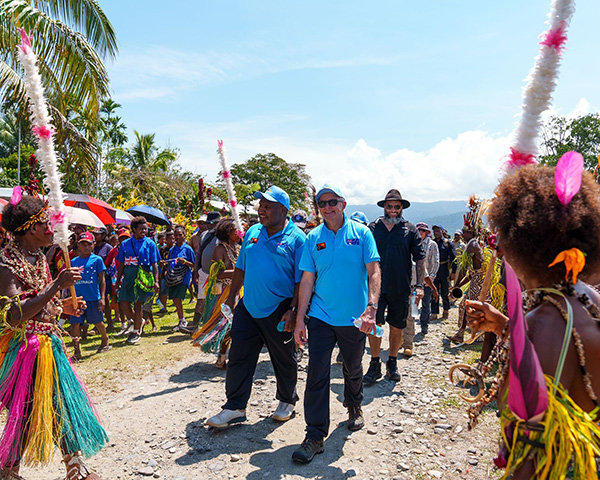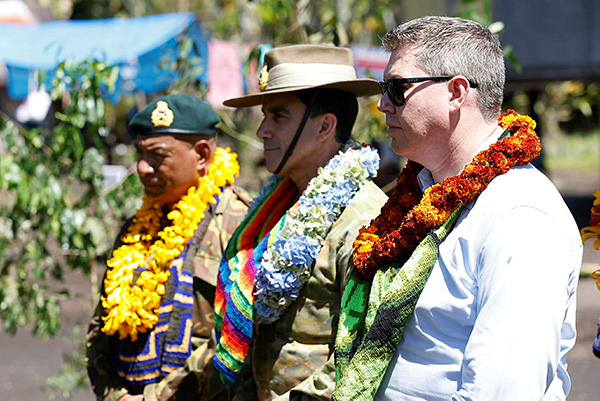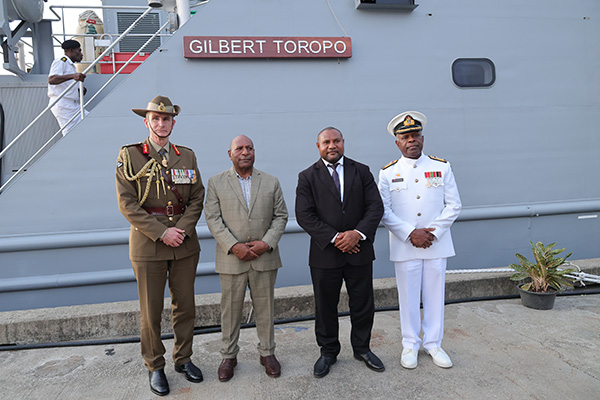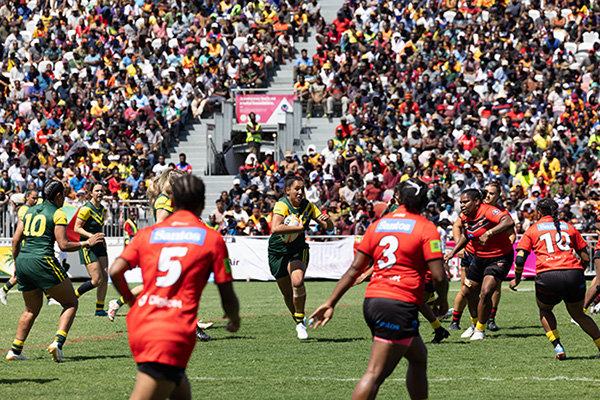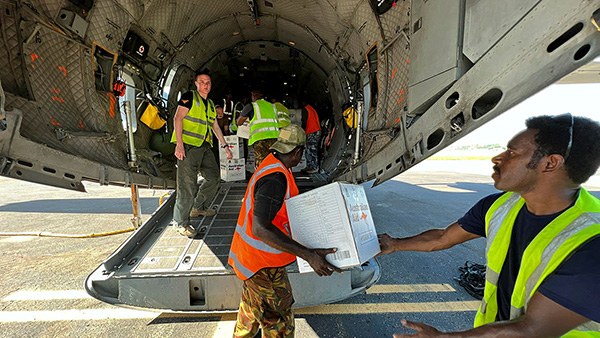Papua New Guinea

On this page
The Papua New Guinea–Australia partnership is dynamic, multi-faceted and comprehensive. Our partnership goes beyond mere words – we are physically connected through our shared maritime border and joined through our rich cultures and history. The deepest commitment and longest lasting bond is through our people. This is exemplified by the volunteers, missionaries, business people, sports players, teachers, students and veterans who have made connections with the people, culture and land.
The Papua New Guinea-Australia Comprehensive Strategic and Economic Partnership (CSEP) signed in 2020, sets out a contemporary vision for what Australia and PNG want to achieve together, committing us to elevate our already close ties.
More about Australia's Pacific engagement and The Office of the Pacific
Security partnerships
On 7 December 2023, Prime Ministers Anthony Albanese and James Marape signed the Bilateral Security Agreement (the Agreement between the Government of Australia and the Government of Papua New Guinea on a Framework for Closer Security Relations). The Agreement is a legally-binding framework for deepening security cooperation between Australia and Papua New Guinea.
It elevates, broadens and modernises our longstanding security relationship and will help Australia and Papua New Guinea work together to contribute to our region’s security.
Bilateral cooperation on security and strategic issues through the work of our diplomats, militaries, police, customs and immigration officials is growing.
The Papua New Guinea-Australia Defence Cooperation Program is by far our largest defence cooperation program with any country. Defence cooperation between our two countries has grown significantly in recent years, based on a recognition that regional security is enhanced by the capacity of our defence forces to successfully work together.
Australia has handed over four Guardian-class patrol boats to PNG to support maritime security in the Pacific region, under the Pacific Maritime Security Program.
The Royal Papua New Guinea Constabulary (RPNGC) and Australian Federal Police (AFP) have a deep and trusted police-to-police partnership. On 24 March 2022, Commissioner Manning (RPNGC) and Commissioner Kershaw (AFP) reaffirmed ongoing close cooperation to address crime and safety issues impacting Papua New Guinea, Australia, and the Blue Pacific, consistent with the 2018 Boe Declaration on Regional Security. The PNG-Australia Policing Partnership (PNG-APP) Mission Design 2022-2026 supports the RPNGC through on-the-shoulder advisors, targeted mentoring, training of emerging leaders and more.
On 30 March 2022, Australia and PNG signed a new Cyber Cooperation agreement. The new agreement builds on a previous cyber security cooperation MoU between PNG and Australia signed in 2018, reinforcing the partnership's focus on enhancing PNG's cyber capacity and working together on cyber affairs. The new MoU paves the way for deepened cooperation to continue building cyber resilience and more broadly supporting a safe, secure, and prosperous PNG, Australia, and Indo-Pacific region.
People-to-people links
Reflecting the close historical association between Australia and Papua New Guinea, there are over 10,000 Australians in PNG at any time, and approximately the same number of PNG nationals in Australia.
Increasing numbers of Papua New Guineans visit Australia each year to study. Australia supports the next generation of leaders in PNG through the prestigious Australia Awards Scholarships. PNG participates in the New Colombo Plan, which gives Australian undergraduates the opportunity to undertake study, research, work placements and internships in our region. By giving students the opportunity to study in PNG, the New Colombo Plan helps to lift knowledge of PNG in Australia and provides a basis for ongoing engagement in business and tertiary education.
Australia adapts education support to meet the priorities of the PNG Government, particularly to meet skilled labour shortages. The Australia Pacific Training Coalition will expand Australia’s support for technical and vocational education and training beyond Port Moresby. This investment will scale up Australian funded trade graduates to more than 600 graduates annually by 2026.
The Pacific Australia Labour Mobility (PALM) scheme provides Papua New Guineans the opportunity to help fill labour shortages in rural and regional Australia. Aussie Orchards (an approved employer) is testament to the confidence Australian employers can gain in PNG workers under the scheme. During the bushfire crisis in late 2019, PNG workers went above and beyond to protect the family-owned farm and its 7,000 avocado trees.
Australia and Papua New Guinea share a deep love of sports. Through PacificAus Sports, we supported PNG's national rugby league and netball teams to compete at major events. PacificAus Sports also helped PNG athletes to prepare for and compete at the Olympic and Commonwealth Games. We will continue to deliver sports for development outcomes through the Team Up program. Papua New Guinea and Australia are using the shared love of sport to improve health, build relationships and enhance institutional and people linkages.
The Kokoda region holds special significance for the relationship between Australia and PNG. Situated within the Owen Stanley Range spanning both PNG’s Oro and Central provinces, the Kokoda region is home to the Kokoda Track, where Australian soldiers prevented the Japanese imperial army from reaching Port Moresby during World War II. Many Papua New Guineans assisted and fought alongside the Australia soldiers. Thousands of Australians travel to PNG to walk the Kokoda Track each year in honour of those who took part in the Kokoda Campaign. The Kokoda Track is a monument to the courage, endurance, mateship and sacrifice of those who served during the war. In 2015, Australia and PNG signed a joint declaration on the preservation of the Kokoda Track Region.
The Australia-Papua New Guinea Network is an initiative to strengthen people-to-people links between the two countries, and to foster practical partnerships and sharing of knowledge between business, civil society, communities and academia. The Network is run by the Lowy Institute for International Policy, in partnership with the National Research Institute of Papua New Guinea.
The annual Australia-PNG Emerging Leaders Dialogue brings together young leaders from both countries across a range of sectors to exchange views on the bilateral relationship and contemporary challenges.
Economic development, trade and investment
Papua New Guinea and Australia share a longstanding close economic relationship.
Australia is PNG’s biggest trade partner with bilateral trade of over $5 billion in 2022-23. We are also a major investor in PNG, with investment valued at around $26 billion in 2022. Data from the Australian Bureau of Statistics indicates more than 4,000 Australian companies export to PNG.
The Australian Trade and Investment Commission (Austrade) assists Australian companies to build and implement their export strategies. Austrade offers practical advice, market intelligence and ongoing support (including financial) to Australian companies looking to grow their business in PNG.
Australia continues to build on its long track record of supporting development and delivering quality infrastructure by financing climate-resilient infrastructure and quality investments through the Australian Infrastructure Financing Facility for the Pacific (AIFFP) and our ongoing bilateral program.
Australia, in conjunction with the International Monetary Fund, the Asian Development Bank and World Bank, supports Papua New Guinea to build a more resilient and sustainable economy, including through a significant program of economic reforms.
Australia’s Development Support
PNG is Australia's largest development partner, with an estimated $637.4 million in Official Development Assistance (ODA) funding (2024-25), an expanding program of blended finance (loans and grants) for infrastructure development under the Australian Infrastructure Financing Facility for the Pacific (AIFFP), and $2.56 billion in budget support loans since 2019 (non-ODA), linked to fiscal repair and economic reform.
Australia's new development plan for PNG – the Australia–Papua New Guinea Development Partnership Plan 2024-2029 (DPP) – translates into action the development priorities Australia shares with PNG. The DPP responds to objectives articulated through the Comprehensive Strategic and Economic Partnership (CSEP) and the Bilateral Security Agreement (BSA). It sets out how we will work together to deliver shared outcomes, and how progress will be monitored. It also identifies where Australia can add value to PNG's national development priorities and how Australia will work with other development actors, ensuring the Australia Government contribution to PNG's development ambitions is well-coordinated.
The DPP focuses on four objectives:
- Objective 1: Building an Economic Partnership for Prosperity
- Objective 2: Promoting Improved Law, Order and Governance
- Objective 3: Investing in People and Building Resilient Communities
- Objective 4: Building Close Friendships and Enduring Ties
In working with PNG to achieve our joint objectives, we will need to balance existing and ongoing priorities, needs and partnership areas, with emerging priorities of the PNG Government and communities. For example, the PNG Government has asked Australia to increase investment in economic infrastructure, including in key areas such as power, telecommunications and ports, while also scaling up efforts in policing, law and justice. Our investments will need to be flexible and responsive to emerging priorities. To achieve impact, we will ensure that the infrastructure we build and the services we support are high quality and deliver for the people of PNG.
The DPP sets a high level of ambition for our cooperation in expanding Australia's efforts and emphasis in several areas, in line with the principles and priorities set out in the PNG-Australia CSEP and the BSA and including across priority areas articulated in PNG's Medium Term Development Plan IV. Key changes to Australia's approach under the DPP will include:
- Scaling up investments in critical economic and social infrastructure from $200m annually to $250m (including AIFFP)
- Increasing support for internal security through our $200 million Bilateral Security Agreement package, in areas such as policing and police infrastructure, law and justice, cyber security, climate change and gender-based violence
- Boosting investment in education from $75m to $100m annually
- Integrating climate considerations across the full breadth of programming
- Intensifying efforts on the promotion of gender equality and disability-inclusive development
- Building longer-term partnerships with civil society organisations
- Establishing new cross-cutting targets, including on locally-led development
- Expanding labour mobility and migration opportunities
- Increasing efforts to streamline travel between the two countries.
Gender
The PNG Women Lead program (PNGWL) is Australia’s new bilateral investment (2023–28, AUD55 million) supporting gender equality in Papua New Guinea (PNG). PNGWL builds on the success of the Pacific Women Shaping Pacific Development initiative (2012 to 2022) and complements the new regional initiative, Pacific Women Lead.
The goal of PNGWL is that PNG women and girls, in all their diversity, are safe and equitably share in resources, opportunities, and decision-making with men and boys.
PNGWL contributes to Australia’s foreign policy gender equality priorities in the Pacific by:
- Enhancing women’s voice in decision-making, leadership and peace building.
- Promoting women’s economic empowerment.
- Ending violence against women and girls.
More about Australia's development program to PNG and Pacific Regional Programs

